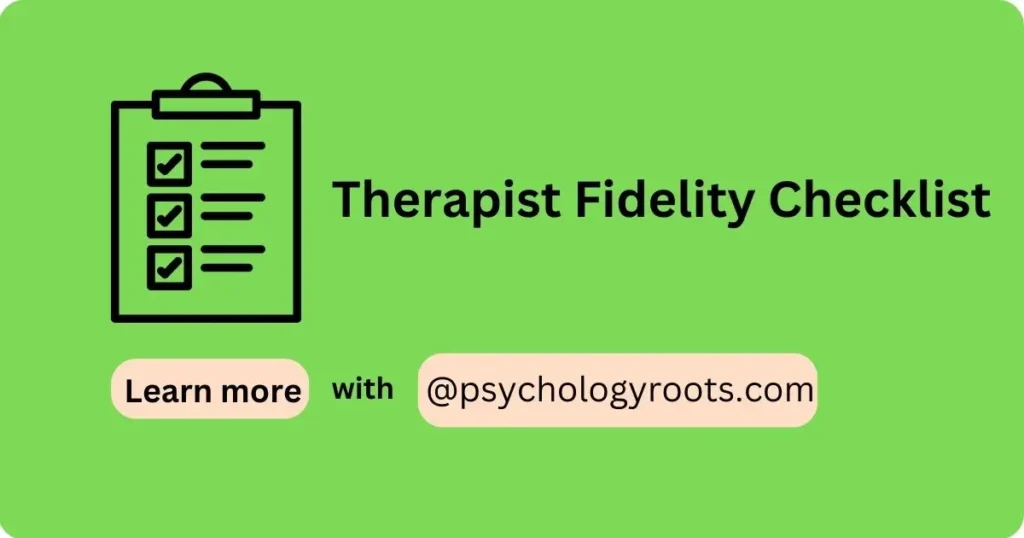Table of Contents
Therapist Fidelity Checklist
Here in this post, we are sharing the “Therapist Fidelity Checklist”. You can read psychometric and Author information. We have thousands of Scales and questionnaires in our collection (See Scales and Questionnaires). You can demand us any scale and questionnaires related to psychology through our community, and we will provide you with a short time. Keep visiting Psychology Roots.
About Therapist Fidelity Checklist
Scale Name
Therapist Fidelity Checklist
Author Details
Michael S. Scheeringa
Translation Availability
English

Background/Description
The Therapist Fidelity Checklist is a structured tool developed by Dr. Michael S. Scheeringa to assess the adherence of therapists to prescribed therapeutic protocols, particularly in the context of treating posttraumatic stress disorder (PTSD) in preschool-aged children. Ensuring treatment fidelity is crucial for both clinical practice and research, as it verifies that interventions are delivered as intended, thereby enhancing the reliability and validity of treatment outcomes. The checklist is designed to be comprehensive, covering various components of therapy sessions to monitor and evaluate therapist performance systematically.
In his book, Treating PTSD in Preschoolers: A Clinical Guide, Dr. Scheeringa emphasizes the importance of fidelity measures in cognitive-behavioral therapy (CBT) for young children. The Therapist Fidelity Checklist is included as an appendix in this manual, providing practitioners with a practical tool to ensure adherence to the treatment protocol.
Administration, Scoring and Interpretation
- Obtain a Copy: The Therapist Fidelity Checklist is available in the appendix of Dr. Scheeringa’s manual, Treating PTSD in Preschoolers: A Clinical Guide. The manual can be purchased through various academic and professional book retailers.
- Explain the Purpose: Inform therapists that the checklist is designed to monitor adherence to the therapeutic protocol, ensuring that each component of the therapy is delivered as intended to maintain treatment integrity.
- Provide Instructions: Therapists should complete the checklist after each therapy session, indicating which components were delivered and noting any deviations or modifications.
- Approximate Time: Completing the checklist typically takes about 5–10 minutes following each session.
- Administer the Checklist: Therapists should fill out the checklist immediately after each session to ensure accurate and timely documentation. Regular review of the completed checklists by supervisors or during peer consultations can help maintain high fidelity to the treatment protocol.
Reliability and Validity
N/A
Available Versions
121-Items
Reference
Scheeringa, M. S. (2015). Treating PTSD in preschoolers: A clinical guide. Guilford Publications.
Important Link
Scale File:
Frequently Asked Questions
What is the purpose of the Therapist Fidelity Checklist?
The checklist is designed to assess and ensure that therapists adhere to the prescribed components of a therapeutic protocol, particularly in the treatment of PTSD in preschool-aged children.
Who developed the Therapist Fidelity Checklist?
Dr. Michael S. Scheeringa developed the checklist as part of his work in adapting cognitive-behavioral therapy for young children with PTSD.
How is the checklist structured?
The checklist is a comprehensive tool that outlines specific components of the therapy sessions, allowing therapists to indicate which elements were delivered and to note any deviations.
How is the checklist administered?
Therapists complete the checklist immediately after each therapy session, documenting adherence to the treatment protocol.
Is the Therapist Fidelity Checklist a reliable and valid measure?
Yes, studies have demonstrated that the checklist is a reliable tool for assessing therapist adherence to treatment protocols, with high interrater agreement reported in clinical trials.
Disclaimer
Please note that Psychology Roots does not have the right to grant permission for the use of any psychological scales or assessments listed on its website. To use any scale or assessment, you must obtain permission directly from the author or translator of the tool. Psychology Roots provides information about various tools and their administration procedures, but it is your responsibility to obtain proper permissions before using any scale or assessment. If you need further information about an author’s contact details, please submit a query to the Psychology Roots team.
Help Us Improve This Article
Have you discovered an inaccuracy? We put out great effort to give accurate and scientifically trustworthy information to our readers. Please notify us if you discover any typographical or grammatical errors.
Make a comment. We acknowledge and appreciate your efforts.
Share With Us
If you have any scale or any material related to psychology kindly share it with us at psychologyroots@gmail.com. We help others on behalf of you.